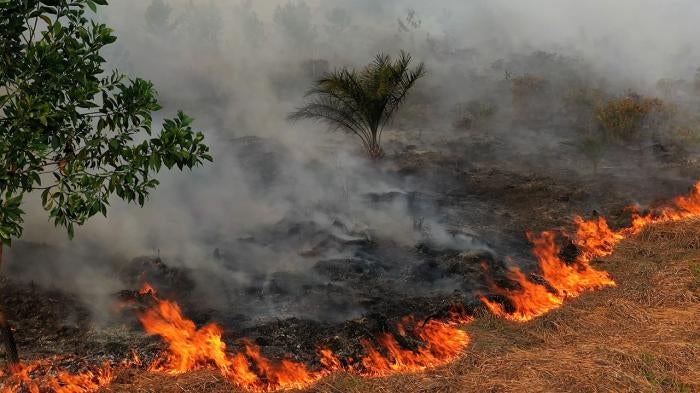Oil Palm Expansion Risks Environment, Harms Communities
Read a text description of this video
Voiceover:
In Indonesia, the government has permitted companies to clear and drain peatlands for large-scale oil palm plantations.
Clearing and draining peatland releases large amounts of stored carbon into the air, accelerating climate change.
Rural communities, including transmigrants from Java, who live on peatlands, risk losing their land and their livelihoods.
Palm oil companies have taken land from villagers without consultation, replacement land, or sufficient compensation, violating rights to property and an adequate standard of living.
Plantation operations contribute to peatland degradation, affecting the local subsistence crop yields and food security.
With the loss of farmland, some women take difficult, low-paying jobs on the plantations or work for no pay to help their families.
Communities trying to protect their land have been intimidated by the police.
The Indonesian government should take urgent action to safeguard local land rights and protect the environment and communities fighting for their rights.
(Jakarta, June 3, 2021) – The harm a palm oil plantation in western Kalimantan, Indonesia, is causing to the surrounding communities and the environment demonstrates the government’s failure to enforce its own policies and laws, Human Rights Watch said in a report released today. There has been no improvement in government protection of residents and the land, and in fact new laws could facilitate the abuses.
The 71-page report, “‘Why Our Land’: Oil Palm Expansion in Indonesia Risks Peatlands and Livelihoods,” examines the conduct of PT Sintang Raya, a subsidiary of South Korean Deasang Corporation, in three tidal villages in West Kalimantan province. Human Rights Watch found that the company has established and expanded its plantations in peatlands, which help to address climate change, without genuine consultation with local residents and without adequate compensation for loss of their farmland or livelihoods. Police have harassed, intimidated, and prosecuted villagers who have resisted or protested.

